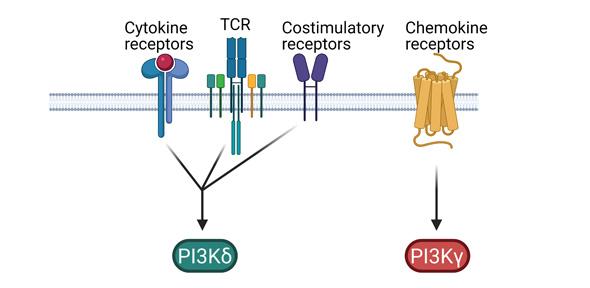
Our research
Our group focuses on how a group of enzymes called phosphoinositide 3-kinases (PI3Ks) which are used by cells of the immune system to instruct and coordinate defences against pathogens. Cells of the immune system can express up to eight different forms of PI3K, each of which can generate second messenger signalling molecules within cells that control diverse of cellular functions and genetic programmes.
We aim to dissect the unique roles played by individual forms of PI3K with particular focus on their roles in B cells and T cells. We also ask what the effect of inhibiting or enhancing the activity of individual forms of PI3K has on immunity to infections and cancer.
Most of our work to date has focused on PI3Kδ. The activation of PI3Kδ is one of the first events that happen inside a T cell or B cell when it first is exposed to a foreign antigen. Because PI3Kδ is expressed at very low levels in other organs in the body, t targeting PI3K with drugs may be an effective way to suppress immune responses without some of the side effects associated with many immunosuppressive drugs in current use.
We therefore work closely with colleagues in pharmaceutical companies who have developed specific inhibitors against PI3Kδ or other forms of PI3K to help predict and understand the effect of such drugs on the immune system.
Recent Publications
Luff DH, Wojdyla K, Oxley D, Chessa T, Hudson K, Hawkins PT, Stephens LR, Barry ST, Okkenhaug K.
Frontiers in Immunology 12, 415
DOI: 10.3389/fimmu.2021.631271
Loss of Phosphatidylinositol 3-Kinase Activity in Regulatory T Cells Leads to Neuronal Inflammation
Stark AK, Davenport ECM, Patton DT, Scudamore CL, Vanhaesebroeck B, Veldhoen M, Garden OA, Okkenhaug K.
J Immunol. 2020. 205 (1) 78-89.
DOI: 10.4049/jimmunol.2000043
Stark AK, Chandra A, Chakraborty K, Alam R, Carbonaro V, Clark J, Sriskantharajah S, Bradley G, Richter AG, Banham-Hall E, Clatworthy MR, Nejentsev S, Hamblin JN, Hessel EM, Condliffe AM, Okkenhaug K.
Nat Commun. 2018. 9(1):3174.
DOI: 10.1038/s41467-018-05674-8
Lim EL, Cugliandolo FM, Rosner DR, Gyori D, Roychoudhuri R, Okkenhaug K.
JCI Insight. 2018. 3(11). pii: 120626.
DOI: 10.1172/jci.insight.120626
Garçon F and Okkenhaug K.
Immunol Cell Biol. 2016. 94(5):486-95.
DOI: 10.1038/icb.2016.1
Professor Klaus Okkenhaug
Principal Investigator
|
Julius Baeck PhD Student |
Leqi Tang Marie |
Muhammed Iqbal PhD Student |
|
Shanlin Tong Marie Sklodowska-Curie PhD Student |
Jin Lee PhD Student |
Cherry Lok lo U PhD Student |








